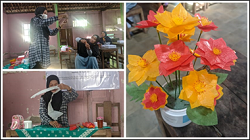Pengelolaan Bank Sampah sebagai implementasi Ekonomi Kreatif di Bank Sampah Guyub Rukun Dusun Madugondo, Kecamatan Piyungan, Bantul Waste Bank Management as an Implementation of the Creative Economy at Guyub Rukun Dusun Madugondo Waste Bank, Piyungan District, Bantul
Main Article Content
Abstract
One of the concrete steps of waste management that can be felt directly by the community in a small scope is the Waste Bank. However, the community often faces problems in managing waste through waste banks, namely related to limited human resources and facilities. The Guyub Rukun Dusun Madugondo waste e Bank is a waste bank that is experiencing problems with limited human resources and facilities. Efforts are needed to overcome the limitations of human resources and facilities so that the waste bank is able to continue to grow. Therefore, this community service activity is carried out to help overcome these problems by providing training methods to improve the managerial skills of waste bank managers and innovation in processing waste into creative economic products as well as providing supporting facilities grants. The training was carried out with waste bank management materials and making flower arrangements from recycled plastic waste materials. Meanwhile, the grant for supporting facilities is realized in the form of a waste press. The results of these community service activities can be felt directly by the waste bank manager and can reduce the problems faced by the Guyub Rukun Dusun Madugondo waste Bank manager.
Downloads
Article Details
Authors who publish with this journal agree to the following terms:
- Any article on the copyright is retained by the author(s).
- Author grant the journal, right of first publication with the work simultaneously licensed under a Creative Commons Attribution License that allows others to share work with acknowledgment of the work authors and initial publications in this journal.
- Authors are able to enter into a separate, additional contractual arrangements for non-exclusive distribution of published articles of work (eg, post-institutional repository) or publish it in a book, with acknowledgment of its initial publication in this journal.
- Authors are permitted and encouraged to post their work online (e.g., in institutional repositories or on their websites) prior to and during the submission process, as can lead to productive exchanges, as well as earlier and greater citation of published work.
- The article and any associated published material is distributed under the Creative Commons Attribution-ShareAlike 4.0 International License
References
Hasnam, L.F., Syarief, R., Yusuf, A.M. 2017. Strategi Pengembangan Bank Sampah di Wilayah Depok. Jurnal Aplikasi Bisnis dan Manajemen (JABM). 3(3):407-416. https://doi.org/10.17358/jabm.3.3.407
Linda, R. 2016. Pemberdayaan Ekonomi Kreatif Melalui Daur Ulang Sampah Plastik (Studi Kasus Bank Sampah Berlian Kelurahan Tangkerang Labuai). Jurnal Al-Iqtishad. 12(1):1-19. http://dx.doi.org/10.24014/jiq.v12i1.4442
Mulyadin, R.M., Ariawan, K., Iqbal, M. 2018. Conflict of Waste Management in DKI Jakarta and its Recomended Solutions. Jurnal Analisis Kebijakan Kehutanan. 15(2):179-191. https://doi.org/10.20886/jakk.2018.15.2.179-191
Suhada, B., Setyawan, D. 2017. Pengembangan Bank Sampah Syariah Ikhtiar Pemberdayaan Memajukan Ekonomi Kreatif (Studi Bank Sampah Cangkir Hijau). Akademika : Jurnal Pemikiran Islam. 22(2):245-265.
Suryani, A.S. 2014. Peran Bank Sampah Dalam Efektivitas Pengelolaan Sampah (Studi Kasus Bank Sampah Malang). Aspirasi: Jurnal Masalah-Masalah Sosial. 5(1):71-84. https://doi.org/10.46807/aspirasi.v5i1.447
Wardani, I.A.K., Pangestu, B.A., Putri, R., Mandagi, A.M., Puspikawati, S.I. 2020. Implementasi Bank Sampah Jelun (BSJ) sebagai Alternatif Solusi Permasalahan Sampah Desa Jelun Banyuwangi. E-Dimas (Educations-Pengabdian kepada Masyarakat). 11(3):343-350. https://doi.org/10.26877/e-dimas.v11i3.5833
Wicaksono, I., Warsono, H. 2020. Manajemen Dalam Pemberdayaan Masyarakat Melalui Bank Sampah ‘Ngudi Lestari’ Kelurahan Tinjomoyo, Kecamatan Banyumanik Kota Semarang. Journal of Public Policy and Management Review. 9(2):1-15. https://doi.org/10.14710/jppmr.v9i2.27358
Widiarti, I.W. 2012. Pengelolaan Sampah Berbasis Zero Waste Skala Rumah Tangga Secara Mandiri. Jurnal Sains Dan Teknologi Lingkungan. 4(2):101-113. https://doi.org/10.20885/jstl.vol4.iss2.art4
Widiyanto, A.F., Rahab. 2017. Partisipasi masyarakat pada bank sampah: Studi kasus eksploratif di Kabupaten Banyumas. Masyarakat, Kebudayaan dan Politik. 30(4):367-376. https://doi.org/10.20473/mkp.V30I42017.367-376
